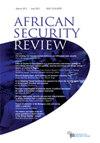Ad-hoc Security Initiatives, an African response to insecurity
IF 1.1
Q3 INTERNATIONAL RELATIONS
引用次数: 7
Abstract
ABSTRACT This article contends that Ad-hoc Security Initiatives (ASI) have developed over the last decade in the Sahel and Lake Chad Basin and represents a new form of African collective security mechanism. The G5 Sahel Force and the Multi-National Joint Task Force emerged from a context-specific need for small clusters of African states to respond collectively to a shared cross-border security threat(s). The existing African Peace and Security Architecture (APSA) mechanisms were not specific and responsive enough to meet this emerging need. Despite substantial investments over the last twenty years by the African Union, Regional Economic Community/ Regional Mechanisms and international partners to establish the African Standby Force, this instrument was not agile enough to respond to the type of threats experienced in the greater Sahel region. In this article, we trace the emergence of a new type of ASI, examine how they fill an essential gap and analyse why the African Standby Force was not able to meet this need. We then consider the implications of these developments for the future of the APSA and how closer collaboration between ASIs and APSA can be developed.非洲应对不安全局势的特设安全倡议
摘要本文认为,特设安全倡议(ASI)在过去十年中在萨赫勒和乍得湖流域发展起来,代表了非洲集体安全机制的一种新形式。萨赫勒五国集团(G5 Sahel Force)和多国联合特遣部队(Multi-National Joint Task Force)是在特定背景下成立的,需要非洲国家的小集群集体应对共同的跨境安全威胁。现有的非洲和平与安全架构机制不够具体,反应不够迅速,无法满足这一新出现的需求。尽管非洲联盟、区域经济共同体/区域机制和国际伙伴在过去二十年中为建立非洲待命部队进行了大量投资,但这一工具不够灵活,无法应对大萨赫勒地区所经历的威胁。在这篇文章中,我们追踪了一种新型ASI的出现,研究了它们如何填补一个重要缺口,并分析了为什么非洲待命部队无法满足这一需求。然后,我们考虑这些发展对APSA未来的影响,以及如何在ASI和APSA之间发展更紧密的合作。
本文章由计算机程序翻译,如有差异,请以英文原文为准。
求助全文
约1分钟内获得全文
求助全文

 求助内容:
求助内容: 应助结果提醒方式:
应助结果提醒方式:


